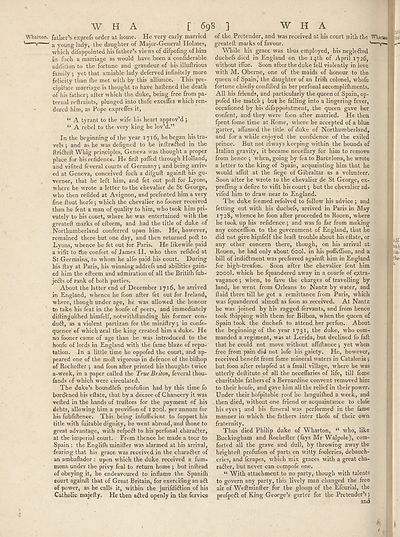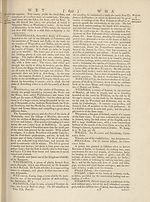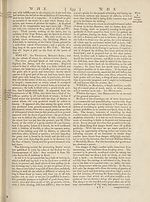Encyclopaedia Britannica, or, a Dictionary of arts, sciences, and miscellaneous literature : enlarged and improved. Illustrated with nearly six hundred engravings > Volume 20, SUI-ZYM
(830) Page 698
Download files
Complete book:
Individual page:
Thumbnail gallery: Grid view | List view

W H A [ 698 ] W H A
Wharton, father’s exprefs order at home. He very early married
'“-■’'v a young lady, the daughter of Major-General Holmes,
which difappointed his father’s views of difpofmg of him
in fuch a marriage as would have been a confiderable
addition to the fortune and grandeur of his illuftrious
family ; yet that amiable lady deferved infinitely more
felicity than (he met with by this alliance. This pre¬
cipitate marriage is thought to have haltened the death
of his father j after which the duke, being free from pa¬
ternal reftraints, plunged into thofe exceffes which ren-
* dered him, as Pope exprefies it,
“ A tyrant to the wife his heart approv’d 5
“ A rebel to the very king he lov’d.”
In the beginning of the year I7I6, he began his tra¬
vels } and as he was defigned to be inftrufted in the
ftriSeft Whig principles, Geneva was thought a proper
place for hisrefidence. He firft pafled through Holland,
and vifited feveral courts of Germany *, and being arriv¬
ed at Geneva, conceived fuch a difguft againft his go¬
vernor, that he left him, and fet out poft for Lyons,
where he ■wrote a letter to the chevalier de St George,
who then refided at Avignon, and prefented him a very
fine flout horfe; which the chevalier no fooner received
than he fent a man of quality to him, who took him pri¬
vately to his court, where he was entertained with the
greateft marks of efleem, and had the title of duke of
Northumberland conferred upon him. He, however,
remained there but one day, and then returned poft to
Lyons, whence he fet out for Paris. He likewife paid
a vifit to The confort of James II. who then refided at
St Germains, to whom he alfo paid his court. During
his ftay at Paris, his winning addrefs and abilities gain¬
ed him the efteem and admiration of all the Britifti tub-
je<fts of rank of both parties.
About the latter end of December 1716, he arrived
in England, whence he foon after fet out for Ireland,
where, though under age, he was allowed the honour
to take his feat in the houfe of peers, and immediately
diftinguifhed himfelf, notwithftanding his former con-
du<ft, as a violent partizan for the miniftry j in confe-
quence of which zeal the king created him a duke. He
no fooner came of age than he was introduced to the
houfe of lords in England with the fame blaze of repu¬
tation. In a little time he oppofed the court, and ap¬
peared one of the molt vigorous in defence of the bilhop
of Rochefter j and foon after printed his thoughts twice
a-week, in a paper called the True Briton, feveral thou-
fands of which were circulated.
The duke’s boundlefs profufion had by this time fo
burdened his eftate, that by a decree of Chancery it was
vefted in the hands of truftees for the payment of his
debts, allowing him a provifion of 1200I. per annum for
his fubfiftenee. This being infufficient to fupport his
title with fuitable dignity, he went abroad, and (hone to
great advantage, with refpeft to his perfonal charatter,
at the imperial court. From thence he made a tour to
Spain : the Englilh minifter was alarmed at his arrival,
fearing that his grace was received in the chara&er of
an ambaflador : upon which the duke received a fum-
mons under the privy feal to return home; but inftead
of obeying it, he endeavoured to inflame the Spanilh
court againft that of Great Britain, for exercifing an a£l
of power, as he calls it, within the jurifdiftion of his
Catholic majefty. He then a&ed openly in the fervice
of the Pretender, and was received at his court with the Wharton
greateft marks of favour. ‘—■“Y"*
While his grace was thus employed, his negle&ed
duchefs died in England on the 14th of April 1726,
without ifiue. Soon after the duke fell violently in love
with M. Oberne, one of the maids of honour to the
queen of Spain, the daughter of an Irilh colonel, whofe
fortune chiefly confided in her perfonal accomplilhments.
All his friends, and particularly the queen of Spain, op¬
pofed the match ; but he falling into a lingering fever,
occafioned by his difappointment,. the queen gave her
confent, and they were foon after married. He then
fpent fome time at Rome, where he accepted of a blue
garter, afiumed the title of duke of Northumberland,
and for a while enjoyed the confidence of the exiled
prince. But not always keeping within the bounds of
Italian gravity, it became neceffary for him to remove
from hence *, when, going by fea to Barcelona, he wrote
a letter to the king of Spain, acquainting him that he
would aflift at the liege of Gibraltar as a volunteer.
Soon after he wrote to the chevalier de St George, ex-
prefling a defire to vifit his court; but the chevalier ad-
vifed him to draw near to England.
The duke feemed refolved to follow his advice; and
fetting out with his duchefs, arrived in Paris in May
1728, whence he foon after proceeded to Rouen, where
he took up his refidence 5 and was fo far from making
any conceflion to the government of England, that he
did not give himfelf the leaft trouble about his eftate, or
any other concern there, though, on his arrival at
Rouen, he had only about 600I. in his pofleflion, and a
bill of indidlment was preferred againft him in England
for high-treafon. Soon after the chevalier fent him
2000I. which he fquandered away in a courfe of extra¬
vagance 5 when, to fave the charges of travelling by
land, he went from Orleans to Nantz by water, and
ft aid there till he got a remittance from Paris, which
was fquandered almoft as foon as received. At Nantz
he was joined by his ragged fervants, and from hence
took (hipping with them for Bilboa, when the queen of
Spain took the duchefs to attend her perfon. About
the beginning of the year 1731, the duke, who com¬
manded a regiment, was at Lerida, but declined fo fall
that he could not move without affiftance j yet when
free from pain did not lofe his gaiety. He, however,
received benefit from fome mineral waters in Catalonia j
but foon after relapfed at a fmall village, where he was
utterly deftitute of all the necelfaries of life, till fome
charitable fathers of a Bernardine convent removed him
to their houfe, and gave him all the relief in their power.
Under their hofpitable roof he languilhed a week, and
then died, without one friend or acquaintance to clofe
his eyes; and his funeral w'as performed in the fame
manner in which the fathers inter thofe of their own
fraternity.
Thus died Philip duke of Wharton, “ who, like
Buckingham and Rochefter (fays Mr Walpole), com¬
forted all the grave and dull, by throwing away the
brighteft profufion of parts on witty fooleries, debauch¬
eries, and ferapes, which mix graces with a great cha-
rafter, but never can compofe one.
“ With attachment to no party, though with talents
to govern any party, this lively man changed the free
air of Weftminfter for the gloom of the Efcurial, the
profpeft of King George’s garter for the Pretender’s;
and
Wharton, father’s exprefs order at home. He very early married
'“-■’'v a young lady, the daughter of Major-General Holmes,
which difappointed his father’s views of difpofmg of him
in fuch a marriage as would have been a confiderable
addition to the fortune and grandeur of his illuftrious
family ; yet that amiable lady deferved infinitely more
felicity than (he met with by this alliance. This pre¬
cipitate marriage is thought to have haltened the death
of his father j after which the duke, being free from pa¬
ternal reftraints, plunged into thofe exceffes which ren-
* dered him, as Pope exprefies it,
“ A tyrant to the wife his heart approv’d 5
“ A rebel to the very king he lov’d.”
In the beginning of the year I7I6, he began his tra¬
vels } and as he was defigned to be inftrufted in the
ftriSeft Whig principles, Geneva was thought a proper
place for hisrefidence. He firft pafled through Holland,
and vifited feveral courts of Germany *, and being arriv¬
ed at Geneva, conceived fuch a difguft againft his go¬
vernor, that he left him, and fet out poft for Lyons,
where he ■wrote a letter to the chevalier de St George,
who then refided at Avignon, and prefented him a very
fine flout horfe; which the chevalier no fooner received
than he fent a man of quality to him, who took him pri¬
vately to his court, where he was entertained with the
greateft marks of efleem, and had the title of duke of
Northumberland conferred upon him. He, however,
remained there but one day, and then returned poft to
Lyons, whence he fet out for Paris. He likewife paid
a vifit to The confort of James II. who then refided at
St Germains, to whom he alfo paid his court. During
his ftay at Paris, his winning addrefs and abilities gain¬
ed him the efteem and admiration of all the Britifti tub-
je<fts of rank of both parties.
About the latter end of December 1716, he arrived
in England, whence he foon after fet out for Ireland,
where, though under age, he was allowed the honour
to take his feat in the houfe of peers, and immediately
diftinguifhed himfelf, notwithftanding his former con-
du<ft, as a violent partizan for the miniftry j in confe-
quence of which zeal the king created him a duke. He
no fooner came of age than he was introduced to the
houfe of lords in England with the fame blaze of repu¬
tation. In a little time he oppofed the court, and ap¬
peared one of the molt vigorous in defence of the bilhop
of Rochefter j and foon after printed his thoughts twice
a-week, in a paper called the True Briton, feveral thou-
fands of which were circulated.
The duke’s boundlefs profufion had by this time fo
burdened his eftate, that by a decree of Chancery it was
vefted in the hands of truftees for the payment of his
debts, allowing him a provifion of 1200I. per annum for
his fubfiftenee. This being infufficient to fupport his
title with fuitable dignity, he went abroad, and (hone to
great advantage, with refpeft to his perfonal charatter,
at the imperial court. From thence he made a tour to
Spain : the Englilh minifter was alarmed at his arrival,
fearing that his grace was received in the chara&er of
an ambaflador : upon which the duke received a fum-
mons under the privy feal to return home; but inftead
of obeying it, he endeavoured to inflame the Spanilh
court againft that of Great Britain, for exercifing an a£l
of power, as he calls it, within the jurifdiftion of his
Catholic majefty. He then a&ed openly in the fervice
of the Pretender, and was received at his court with the Wharton
greateft marks of favour. ‘—■“Y"*
While his grace was thus employed, his negle&ed
duchefs died in England on the 14th of April 1726,
without ifiue. Soon after the duke fell violently in love
with M. Oberne, one of the maids of honour to the
queen of Spain, the daughter of an Irilh colonel, whofe
fortune chiefly confided in her perfonal accomplilhments.
All his friends, and particularly the queen of Spain, op¬
pofed the match ; but he falling into a lingering fever,
occafioned by his difappointment,. the queen gave her
confent, and they were foon after married. He then
fpent fome time at Rome, where he accepted of a blue
garter, afiumed the title of duke of Northumberland,
and for a while enjoyed the confidence of the exiled
prince. But not always keeping within the bounds of
Italian gravity, it became neceffary for him to remove
from hence *, when, going by fea to Barcelona, he wrote
a letter to the king of Spain, acquainting him that he
would aflift at the liege of Gibraltar as a volunteer.
Soon after he wrote to the chevalier de St George, ex-
prefling a defire to vifit his court; but the chevalier ad-
vifed him to draw near to England.
The duke feemed refolved to follow his advice; and
fetting out with his duchefs, arrived in Paris in May
1728, whence he foon after proceeded to Rouen, where
he took up his refidence 5 and was fo far from making
any conceflion to the government of England, that he
did not give himfelf the leaft trouble about his eftate, or
any other concern there, though, on his arrival at
Rouen, he had only about 600I. in his pofleflion, and a
bill of indidlment was preferred againft him in England
for high-treafon. Soon after the chevalier fent him
2000I. which he fquandered away in a courfe of extra¬
vagance 5 when, to fave the charges of travelling by
land, he went from Orleans to Nantz by water, and
ft aid there till he got a remittance from Paris, which
was fquandered almoft as foon as received. At Nantz
he was joined by his ragged fervants, and from hence
took (hipping with them for Bilboa, when the queen of
Spain took the duchefs to attend her perfon. About
the beginning of the year 1731, the duke, who com¬
manded a regiment, was at Lerida, but declined fo fall
that he could not move without affiftance j yet when
free from pain did not lofe his gaiety. He, however,
received benefit from fome mineral waters in Catalonia j
but foon after relapfed at a fmall village, where he was
utterly deftitute of all the necelfaries of life, till fome
charitable fathers of a Bernardine convent removed him
to their houfe, and gave him all the relief in their power.
Under their hofpitable roof he languilhed a week, and
then died, without one friend or acquaintance to clofe
his eyes; and his funeral w'as performed in the fame
manner in which the fathers inter thofe of their own
fraternity.
Thus died Philip duke of Wharton, “ who, like
Buckingham and Rochefter (fays Mr Walpole), com¬
forted all the grave and dull, by throwing away the
brighteft profufion of parts on witty fooleries, debauch¬
eries, and ferapes, which mix graces with a great cha-
rafter, but never can compofe one.
“ With attachment to no party, though with talents
to govern any party, this lively man changed the free
air of Weftminfter for the gloom of the Efcurial, the
profpeft of King George’s garter for the Pretender’s;
and
Set display mode to:
![]() Universal Viewer |
Universal Viewer | ![]() Mirador |
Large image | Transcription
Mirador |
Large image | Transcription
Images and transcriptions on this page, including medium image downloads, may be used under the Creative Commons Attribution 4.0 International Licence unless otherwise stated. ![]()
| Permanent URL | https://digital.nls.uk/192285337 |
|---|
| Description | Plates 516, 519 and 520 missing. |
|---|---|
| Attribution and copyright: |
|
| Description | Ten editions of 'Encyclopaedia Britannica', issued from 1768-1903, in 231 volumes. Originally issued in 100 weekly parts (3 volumes) between 1768 and 1771 by publishers: Colin Macfarquhar and Andrew Bell (Edinburgh); editor: William Smellie: engraver: Andrew Bell. Expanded editions in the 19th century featured more volumes and contributions from leading experts in their fields. Managed and published in Edinburgh up to the 9th edition (25 volumes, from 1875-1889); the 10th edition (1902-1903) re-issued the 9th edition, with 11 supplementary volumes. |
|---|---|
| Additional NLS resources: |
|

